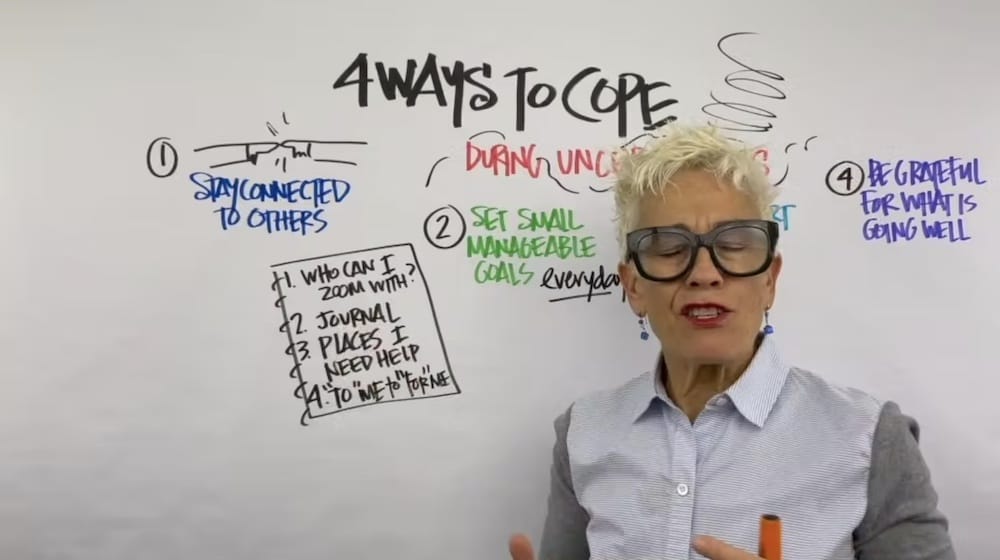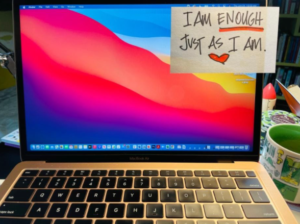
Are you finding yourself increasingly overwhelmed by the fear of catching COVID?
Do you find it is hard to stay focused on your job or your business? Are you frustrated with the continuous lockdown?
There are a few simple things you can do to help calm your anxiety, feel less uncertain and shift your patterns. Add these four coping strategies to your toolbox, so you can build your resilience to uncertainty, maintain focus on the things that matter, and respond to your fears and frustrations constructively.

Here are 4 Ways to Cope with Uncertain Times:
1. Stay Connected to Others
One of the hardest parts about the pandemic is that we can’t go to the movies or meet friends for dinner. We aren’t able to connect with our clients or customers face to face. Going to a football game isn’t an option. That limits our ability to stay in touch and literally touch others, which is hard on our psyche.
“Human beings are wired to touch and be touched. When a child is born, that is how they bond with their mother—through touch,” said Asim Shah, M.D., professor and executive vice chair of the Menninger Department of Psychiatry at Baylor College of Medicine. “Our wiring system has touch everywhere, so it’s difficult for us not to think about physical contact.”

If we can’t touch each other physically, it’s important to do so virtually and it will help you feel some normalcy in your weekly routine. Set a regular schedule to connect with your friends virtually.
Then, when you have them on the zoom call with you, tell them how much you love them with a virtual hug. When you say “Here’s a hug,” take a moment to wrap your arms around yourself and literally give yourself a hug. Your body needs to feel physical contact even if you are just tricking it by hugging yourself. One of the fantastic things about your brain is how easily it can be tricked.
We all need physical touch, while your own touch isn’t the same as the touch of others, just making the gesture will actually help you feel connected. Of course, if you have a pet, be sure to hug them too.
2. Set Small, Manageable Goals Everyday
Life right now is super distracting. When the only way you can connect with others is through your phone, it becomes a magnet for your attention. Mine starts calling my name every 30 seconds.
This is not helpful when you try to focus on accomplishing goals like trying to move your business forward or attempting to finish that important project. One of the tips I got from doing a 30 day challenge with Dr. Benjamin Hardy, author of Personality isn’t Permanent, is every night, before you go to sleep, to review your goals.
Write down what you have accomplished that day, and I would add, be grateful for every little thing that’s happened no matter how small. Then set your goals for tomorrow. It is the small goals that add up to the big accomplishments, and it will help keep your anxiety at bay when you can track your progress.

3. Get Support When You Need It
Because of these uncertain times, you may have lost your job or found yourself picking up bad habits like eating or drinking too much. Maybe you haven’t been communicating well with your partner or your co-workers.
Stress has a weird way of creeping up on you until you feel overwhelmed and out of control. It is critical to have someone other than your partner or day to day friendships who is willing to support you when the stress begins to grow.
There are counseling centers where you can find support that are connected to your insurance or that you can find for , free or a low cost.
Now is the time to change those negative behaviors so that when COVID is over you have better communication skills and have dealt with that addiction issue you’ve been hiding. This is the time to step it up and reach out to get the help you need. Pick up the phone and call someone you can trust to talk, or contact your clergy for spiritual support.

4. Be Grateful for What is Going Well
Gratitude is the ultimate wheel greaser for increasing your ability to manage uncertainty. It requires a mental shift from feeling victimized by negative things that are happening in your world to realizing that good things are coming because of the changes, even if you can’t quite see them yet.
This mindset shift from something happening “to you”, to something happening “for you” will help you remember that you are growing and changing every single moment of every day. Being grateful for every single little thing will help you increase your resilience to change and uncertainty. That flexible mindset is essential for you in order to step into the future that you really want and are working towards.

Change is ongoing and if you don’t change with it, you risk feeling overwhelmed and demotivated. Your resilience is key to you being able to manage your stress from uncertainty and continue to learn, grow and achieve those goals for your business and your life.
Tasks for Coping with Uncertainty
Here are some tasks that you can complete that will help you cope with uncertainty:
- Make a list of the people in your life that you want to talk to. Then email them and set a time in your calendar to Facetime or Zoom with them this weekend!
- If you don’t have a journal, get one, make one, just for your goals, your gratitude and your actions. Track your progress every night before you go to sleep.
- List the things that you need support for – health, spirituality, communication. Then find something online to help you – free class or therapist. Prioritize your self-care!
- Grab your journal and find a place by yourself to reflect on where you have been feeling victimized. Then reflect on how this has actually helped you to grow.




